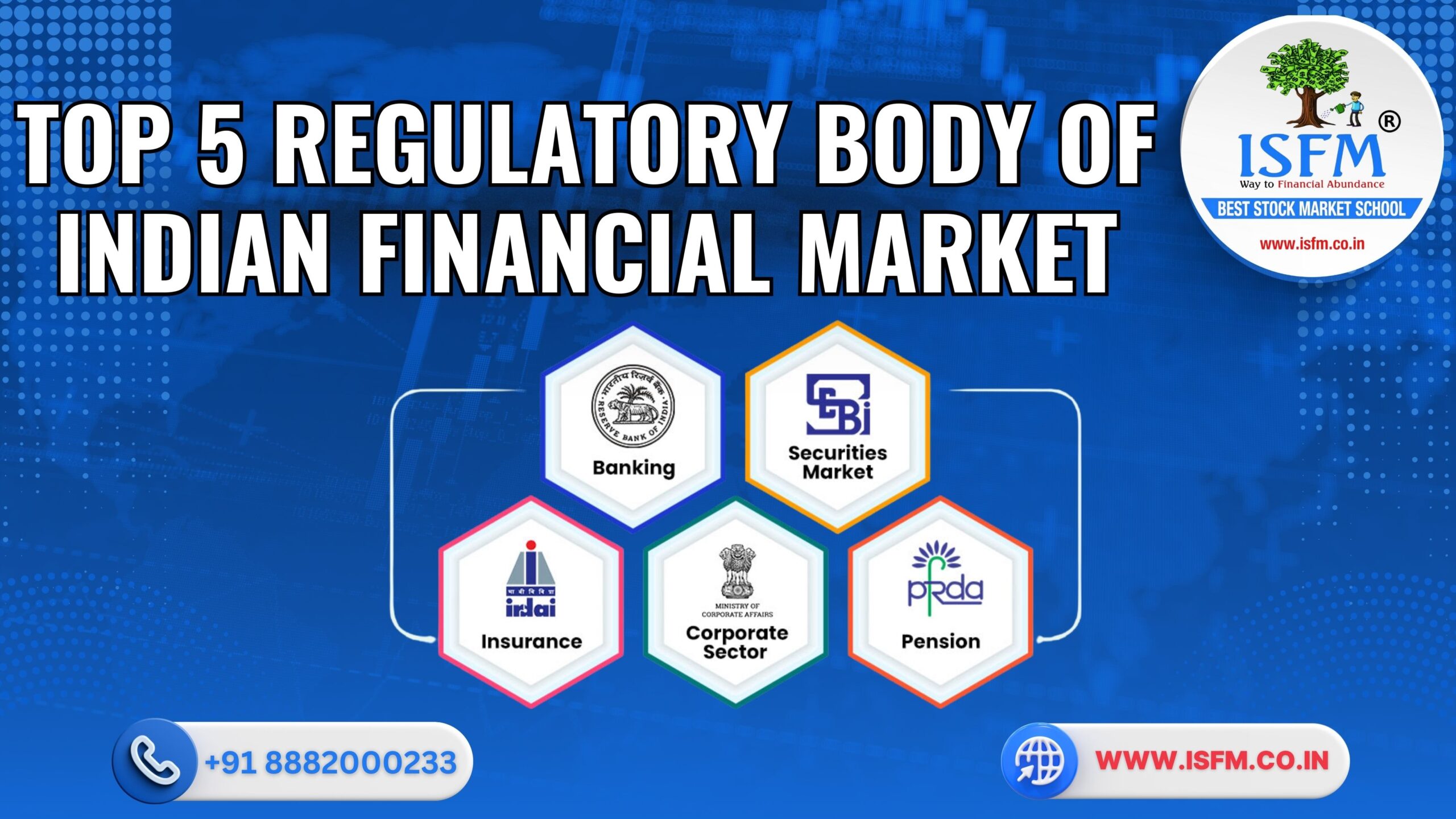Top 5 Regulatory Bodies of the Indian Financial Market: Roles, Impact & Future Vision

The Indian financial market is anchored in transparency, trust, and innovation, all made possible by a network of powerful regulatory authorities. These institutions not only uphold financial discipline but also shape the direction of India’s economic evolution. In this guide, we spotlight the top 5 financial regulatory bodies in India, their core responsibilities, market impact, and vision for the future.
1. Securities and Exchange Board of India (SEBI)
Why SEBI Matters
As the primary regulator for the securities market, SEBI ensures investor protection and facilitates fair trade practices. Its regulatory purview spans across stock exchanges, brokers, mutual funds, and more.
Key Responsibilities
- Investor Protection: Enforces transparency through mandatory disclosures and clamps down on insider trading and manipulation.
- Market Innovation: Launched initiatives like T+1 settlement, REITs, and InvITs to expand investment avenues.
- Tech Surveillance: Utilizes AI and analytics for real-time market monitoring.
Forward Vision
- Blockchain Adoption: Exploring Distributed Ledger Technology (DLT) to enhance security.
- ESG Push: Focusing on sustainable investment frameworks.
2. Reserve Bank of India (RBI)
Why RBI Matters
The RBI acts as the monetary and banking regulator of India. It balances growth with inflation control while promoting financial inclusion.
Key Responsibilities
- Monetary Policy Tools: Adjusts repo rates, CRR, and SLR to manage inflation and liquidity.
- Digital Ecosystem: Manages UPI, NEFT, IMPS, and digital wallets.
- Banking Oversight: Implements global standards like Basel III for stability.
Forward Vision
- Digital Currency: Rolling out the Digital Rupee (CBDC) for secure digital payments.
- Fintech Synergy: Supporting innovation via regulatory sandboxes.
Impact on Market
Strengthens the banking infrastructure, maintains price stability, and promotes digital payment adoption.
3. Insurance Regulatory and Development Authority of India (IRDAI)
Why IRDAI Matters
IRDAI oversees India’s insurance sector, ensuring companies act ethically while offering value to policyholders.
Key Responsibilities
- Policyholder Protection: Enforces standard policy terms and prompt grievance redressal.
- Capital Norms: Enforces solvency margins for financial soundness.
- Product Innovation: Encourages micro-insurance, pandemic insurance, and digital policies.
Forward Vision
- Smart Underwriting: Integrating AI and big data for dynamic pricing.
- Health Inclusion: Expanding coverage to rural and semi-urban regions.
Impact on Market
Fosters trust in insurance products and enhances penetration across underserved demographics.
4. Pension Fund Regulatory and Development Authority (PFRDA)
Why PFRDA Matters
Tasked with overseeing pension frameworks like the National Pension System (NPS), PFRDA ensures a secure financial future for Indian citizens.
Key Responsibilities
- NPS Management: Offers structured Tier I and Tier II retirement accounts.
- Fund Supervision: Licenses Pension Fund Managers (PFMs) for optimal asset allocation.
- Inclusion Programs: Runs Atal Pension Yojana (APY) for informal sector workers.
Forward Vision
- Gig Worker Integration: Expanding NPS to the freelance and gig economy.
- International Collaboration: Adopting global best practices for sustainability.
Impact on Market
Encourages long-term investing habits and reduces pressure on public retirement systems.
Also Read: Algorithmic Trading Explained: Features, Benefits, Future Trends & Should You Use It?
5. Financial Stability and Development Council (FSDC)
Why FSDC Matters
FSDC acts as a super-regulator, promoting coordination among bodies like RBI, SEBI, IRDAI, and PFRDA to maintain systemic stability.
Key Responsibilities
- Systemic Risk Oversight: Evaluates threats like NBFC defaults or financial contagion.
- Inter-Regulatory Alignment: Harmonizes rules and responses across institutions.
- Crisis Management: Develops contingency measures for financial upheavals.
Forward Vision
- Cyber Resilience: Building stronger cybersecurity infrastructure.
- Climate Risk Frameworks: Introducing climate-linked financial guidelines.
Impact on Market
Enables a holistic regulatory framework, reducing sectoral conflicts and increasing economic resilience.
How These Regulatory Bodies Transform the Financial Landscape
- Investor Trust: SEBI and RBI establish transparent and safe investment environments.
- Innovation Enablement: IRDAI and PFRDA promote product evolution to suit modern needs.
- Risk Reduction: FSDC ensures the market remains stable and protected against crises.
- Inclusive Growth: Programs like NPS and APY empower rural and urban populations alike.
Vision 2030: What Lies Ahead
India’s financial regulators are gearing up for a transformative decade. Here’s what to expect:
- Advanced Tech Integration: Broader use of AI, Blockchain, and CBDCs.
- Sustainable Finance: ESG-compliance and green investment standards.
- Financial Access: Better outreach via digital public infrastructure.
Conclusion
India’s financial regulators — SEBI, RBI, IRDAI, PFRDA, and FSDC — are pillars of the nation’s economic success. Through proactive policy-making, technology adoption, and stakeholder protection, these bodies not only safeguard the present but also shape a robust, inclusive, and future-ready financial ecosystem.


